9:12pm: Bobby Fischer is World Chess Champion
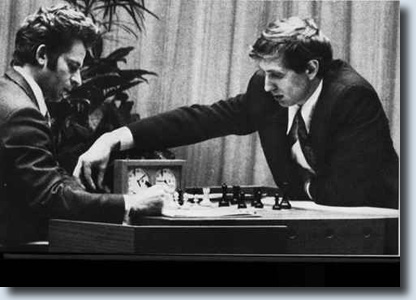
Bobby Fischer beating Boris Spassky in
Reykjavik, Iceland, Aug. 31, 1972
In the summer of 1972, 29-year-old U.S. chess sensation Bobby Fischer took on reigning Soviet world chess champion Boris Spassky in Reykjavik, Iceland. The Soviets had held the world chess title since 1948, and no American had ever won the world title. However, with Fischer, who at age 15 was the youngest grandmaster ever, the United States finally had a contender. After several delays caused by the famously argumentative Fischer, the "chess match of the century" got underway on July 11. The grueling championship, which was hailed as a struggle between capitalism against communism, attracted unprecedented media attention for a chess match. After a month, it was clear that Fischer was headed for victory. On August 31 Spassky was forced to concede. Fischer's victory gave the popularity of chess a tremendous boost in the United States, but the world champion himself declined to capitalize on his fame. In 1975, when by international chess rules he was forced to defend his title, he refused to meet his Soviet challenger over a petty complaint. His title was thus forfeited. He subsequently gave up professional chess and became a recluse. In 1992, he agreed to a rematch with Spassky in Yugoslavia and again defeated the Russian. Today, Fischer is believed to play an occasional, anonymous game of chess against other grandmasters on the Internet. (From The History Channel)
One A.M.: Mary Wollstonecraft Shelley
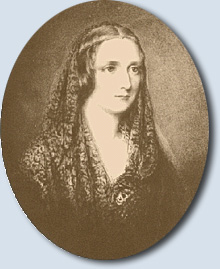
Mary Wollstonecraft Shelley
Born: Aug. 30, 1797
"It is quite difficult to believe that a young girl of 18 years old would be the author of a book that would become the first monster film, creation film, bionic film, horror film, publicly banned film, and the first of many Frankenstein films. But we must give this young girl credit for her literary talent and active imagination. Mary Shelley is responsible for many fine literary works of art but none are as famous as Frankenstein or The Modern Prometheus (Click for full Online Text) published in 1818. The tale Shelley tells is of a young Dr. Frankenstein who tries to create a living being but instead creates a monster.
There are many interesting theories on the reasons why Shelley wrote Frankenstein. The book was started while vacationing at Lake Geneva with her husband Percy, Lord Byron, and John Polidari. Lord Byron challenged the group to write a ghost story. Mary was slow to come up with an idea for her story but after she had the following "waking" nightmare she began to write the famous Frankenstein novel that would take her almost 2 years to publish:
I saw the pale student of unhallowed arts kneeling beside the thing he had put together. I saw the hideous phantasm of a man stretched out, then on the working of some powerful engine, show signs of life...his success would terrify the artist; he would rush away...hope that...this thing...would subside into dead matter...he opens his eyes; behold the horrid thing stands back at this beside opening his curtains...
Mary now had the basis of her story and went on to complete the novel in the spring of 1817 and have it published January 1, 1818. Frankenstein can be read with many different view points in mind. Was Mary simply writing of the nightmare she had in Lake Geneva or was she writing about the fears she had about child birth. At the time she wrote Frankenstein she had lost one child and had a 6 month old to care for. Frankenstein can be viewed as a reflection of Mary's fears of having a deformed child or a child she could not love.
200 years ago Mary Wollstonecraft Shelley was born and so to was the beginning of the age of horror. There are many sites on the Internet that detail all of Mary Shelley's life. An extensive list of links to sites about Shelley, Frankenstein, Edison, & more are available on the order confirmation page." (From "The Original Thomas Edison's Frankenstein.")
Round Midnite: Angie Hiesl, Performance Artist
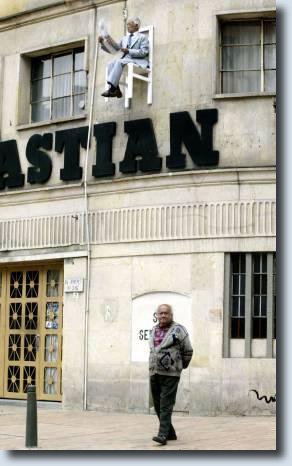
A German choreographer and performance artist, Angie Hiesl, has suspended ten chairs nearly 20 feet above Jimenez Avenue in Bogota, Colombia, and has performers sit in them carrying on normal activities.
I love this stuff.
Round Midnite: A Man Who Dreamt For A World
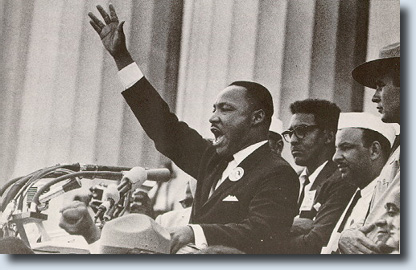
Dr. Martin Luther King, Jr. delivering his
"I Have A Dream" Speech: Aug. 28, 1963
"On the steps of the Lincoln Memorial in Washington, D.C., the African American civil rights movement reaches its high-water mark when Martin Luther King, Jr., speaks to more than 200,000 people attending the March on Washington. The demonstrators--black and white, poor and rich--came together in the nation's capital to demand voting rights and equal opportunity for African Americans and to appeal for an end to racial segregation and discrimination.
The peaceful rally was the largest assembly for a redress of grievances that the capital had ever seen, and King was the last speaker. With the statue of Abraham Lincoln--the Great Emancipator--towering behind him, King evoked the rhetorical talents he had developed as a Baptist preacher to articulate how the "Negro is still not free." He told of the struggle ahead, stressing the importance of continued action and nonviolent protest. Coming to the end of his prepared text (which, like other speakers that day, he had limited to seven minutes), he was overwhelmed by the moment and launched into an improvised sermon.
He told the hushed crowd, "Go back to Mississippi, go back to Alabama, go back to Georgia, go back to Louisiana, go back to the slums and ghettoes of our northern cities, knowing that somehow this situation can and will be changed." Continuing, he began the refrain that made the speech one of the best known in U.S. history, second only to Lincoln's 1863 "Gettysburg Address":
"I have a dream," he boomed over the crowd stretching from the Lincoln Memorial to the Washington Monument, "that one day this nation will rise up and live out the true meaning of its creed: 'We hold these truths to be self-evident: that all men are created equal.' I have a dream that one day on the red hills of Georgia the sons of former slaves and the sons of former slaveowners will be able to sit down together at a table of brotherhood. I have a dream that one day even the state of Mississippi, a desert state, sweltering with the heat of injustice and oppression, will be transformed into an oasis of freedom and justice. I have a dream that my four children will one day live in a nation where they will not be judged by the color of their skin but by the content of their character. I have a dream today."
King had used the "I have a dream" theme before, in a handful of stump speeches, but never with the force and effectiveness of that hot August day in Washington. He equated the civil rights movement with the highest and noblest ideals of the American tradition, and for many Americans--white and black--the importance of racial equality was seen with a new and blinding clarity. He ended his stirring, 16-minute speech with his vision of the fruit of racial harmony:
"When we let freedom ring, when we let it ring from every village and every hamlet, from every state and every city, we will be able to speed up that day when all of God's children, black men and white men, Jews and Gentiles, Protestants and Catholics, will be able to join hands and sing in the words of the old Negro spiritual, 'Free at last! Free at last! Thank God Almighty, we are free at last!'"
In the year after the March on Washington, the civil rights movement achieved two of its greatest successes: the ratification of the 24th Amendment to the Constitution, which abolished the poll tax and thus a barrier to poor African American voters in the South; and the passage of the Civil Rights Act of 1964, which prohibited racial discrimination in employment and education and outlawed racial segregation in public facilities. In October 1964, Martin Luther King, Jr., was awarded the Nobel Peace Prize. On April 4, 1968, he was shot to death while standing on a motel balcony in Memphis, Tennessee; the gunman was escaped convict James Earl Ray." (From The History Channel)
Click "More..." below for the full text of the speech:
MARTIN LUTHER KING, JR.
"I am happy to join with you today in what will go down in history as the greatest demonstration for freedom in the history of our nation.
Fivescore years ago, a great American, in whose symbolic shadow we stand today, signed the Emancipation Proclamation. This momentous decree came as a great beacon light of hope to millions of Negro slaves who had been seared in the flames of withering injustice. It came as a joyous daybreak to end the long night of their captivity.
But one hundred years later, the Negro still is not free; one hundred years later, the life of the Negro is still sadly crippled by the manacles of segregation and the chains of discrimination; one hundred years later, the Negro lives on a lonely island of poverty in the midst of a vast ocean of material prosperity; one hundred years later, the Negro is still languished in the corners of American society and finds himself in exile in his own land.
So we've come here today to dramatize a shameful condition. In a sense we've come to our nation's capital to cash a check. When the architects of our republic wrote the magnificent words of our Constitution and the Declaration of Independence, they were signing a promissory note to which every American was to fall heir. This note was the promise that all men, yes, black men as well as white men, would be guaranteed the unalienable rights of life, liberty, and the pursuit of happiness.
It is obvious today that America has defaulted on this promissory note in so far as her citizens of color are concerned. Instead of honoring this sacred obligation, America has given the Negro people a bad check ; a check which has come back marked "insufficient funds." We refuse to believe that there are insufficient funds in the great vaults of opportunity of this nation.
And so we've come to this hallowed spot to remind America of the fierce urgency of now. This is no time to engage in the luxury of cooling off or to take the tranquilizing drug of gradualism. Now is the time to make real the promises of democracy; now is the time to rise from the dark and desolate valley of segregation to the sunlit path of racial justice; now is the time to lift our nation from the quicksands of racial injustice to the solid rock of brotherhood; now is the time to make justice a reality for all God's children. It would be fatal for the nation to overlook the urgency of the movement. This sweltering summer of the Negro's legitimate discontent will not pass until there is an invigorating autumn of freedom and equality.
Nineteen sixty-three is not and end, but a beginning. And those who hope that the Negro needed to blow off steam and will now be content, will have a rude awakening if the nation returns to business as usual.
There will be neither rest nor tranquility in America until the Negro is granted his citizenship rights. The whirlwinds of revolt will continue to shake the foundations of our nation until the bright day of justice emerges.
But there is something that I must say to my people who stand on the warm threshold which leads into the palace of justice. In the process of gaining our rightful place we must not be guilty of wrongful deeds.
Let us not seek to satisfy our thirst for freedom by drinking from the cup of bitterness and hatred. We must forever conduct our struggle on the high plane of dignity and discipline. We must not allow our creative protest to degenerate into physical violence. Again and again we must rise to the majestic heights of meeting physical force with soul force.
The marvelous new militancy which has engulfed the Negro community must not lead us to distrust of all white people, for many of our white brothers, as evidenced by their presence here today, have come to realize that their destiny is tied up with our destiny and they have come to realize that their freedom is inextricably bound to our freedom. This offense we share mounted to storm the battlements of injustice must be carried forth by a biracial army. We cannot walk alone.
And as we walk, we must make the pledge that we shall always march ahead. We cannot turn back. There are those who are asking the devotees of civil rights, "When will you be satisfied?: We can never be satisfied as long as the Negro is the victim of the unspeakable horrors of police brutality.
We can never be satisfied as long as our bodies, heavy with fatigue of travel, cannot gain lodging in the motels of the highways and the hotels of the cities. We cannot be satisfied as long as the Negro's basic mobility is from a smaller ghetto to a larger one.
We can never be satisfied as long as our children are stripped of their selfhood and robbed of their dignity by signs stating "for whites only." We cannot be satisfied as long as a Negro in Mississippi cannot vote and a Negro in New York believes he has nothing for which to vote. No, we are not satisfied, and we will not be satisfied until justice rolls down like waters and righteousness like a mighty stream.
I am not unmindful that some of you have come here out of excessive trials and tribulation. Some of you have come fresh from narrow jail cells. Some of you have come from areas where your quest for freedom left you battered by the storms of persecution and staggered by the winds of police brutality. You have been the veterans of creative suffering. Continue to work with the faith that unearned suffering is redemptive.
Go back to Mississippi; go back to Alabama; go back to Louisiana; go back to the slums and ghettos of the northern cities, knowing that somehow this situation can, and will be changed. Let us not wallow in the valley of despair.
So I say to you, my friends, that even though we must face the difficulties of today and tomorrow, I still have a dream. It is a dream deeply rooted in the American dream that one day this nation will rise up and live out the true meaning of its creed - we hold these truths to be self-evident, that all men are created equal.
I have a dream that one day on the red hills of Georgia, sons of former slaves and sons of former slave-owners will be able to sit down together at the table of brotherhood.
I have a dream that one day, even the state of Mississippi, a state sweltering with the heat of injustice, sweltering with the heat of oppression, will be transformed into an oasis of freedom and justice.
I have a dream my four little children will one day live in a nation where they will not be judged by the color of their skin but by the content of their character. I have a dream today!
I have a dream that one day every valley shall be exalted, every hill and mountain shall be made low, the rough places shall be made plain, and the crooked places shall be made straight and the glory of the Lord will be revealed and all flesh shall see it together.
This is our hope. This is the faith that I go back to the South with.
With this faith we will be able to hear out of the mountain of despair a stone of hope. With this faith we will be able to transform the jangling discords of our nation into a beautiful symphony of brotherhood.
With this faith we will be able to work together, to pray together, to go to jail together, knowing that we will be free one day. This will be the day when all of God's children will be able to sing with new meaning-"my country 'tis of thee; sweet land of liberty; of thee I sing; land where my fathers died, land of the pilgrim's pride; from every mountain side, let freedom ring"-and if America is to be a great nation, this must become true.
Let freedom ring from the mighty mountains of New York.
Let freedom ring from the heightening Alleghenies of Pennsylvania.
Let freedom ring from the snow-capped Rockies of Colorado.
Let freedom ring from the curvaceous slopes of California.
But not only that.
Let freedom ring from the Stone Mountain of Georgia.
Let freedom ring from Lookout Mountain of Tennessee.
Let freedom ring from every hill and molehill of Mississippi, from every mountainside, let freedom ring.
And when we allow freedom to ring, when we let it ring from every village and hamlet, from every state and city, we will be able to speed up that day when all of God's children - black men and white men, Jews and Gentiles, Catholics and Protestants - will be able to join hands and to sing in the words of the old Negro spiritual, "Free at last, free at last; thank God Almighty, we are free at last."
Round Midnite: The World Was Watching
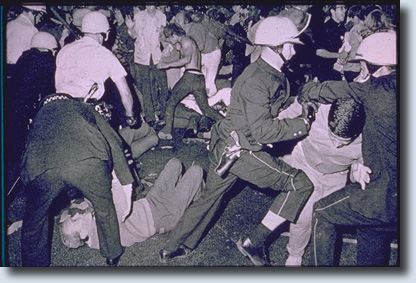
1968 Democratic convention besieged by protesters
"As the Democratic National Convention gets underway in Chicago, thousands of antiwar demonstrators take to Chicago's streets to protest the Vietnam War and its support by the top Democratic presidential candidate, Vice President Hubert Humphrey. During the four-day convention, the most violent in U.S. history, police and National Guardsmen clashed with protesters outside the International Amphitheater, and hundreds of people, including innocent bystanders, were beaten by the Chicago police. The violence even spilled into the convention hall, as guards roughed up delegates and members of the press, including CBS News correspondent Mike Wallace, who was punched in the face. On August 29, Humphrey secured the nomination and the convention ended.
In the convention's aftermath, a federal commission investigating the convention described one of the confrontations as a "police riot" and blamed Chicago Mayor Richard Daley for inciting his police to violence. Nevertheless, eight political radicals--the so- called "Chicago Eight"--were arrested on charges of conspiring to incite the violence, and in 1969 their trial began in Chicago, sparking new waves of protests in the city." (From The History Channel)
Brief History Of Chicago's 1968 Democratic Convention
(Sources: "Miami and the Siege of Chicago" by Norman Mailer, Facts on File, CQ's Guide to U.S. Elections)
"The 1968 Democratic Convention, held on August 26-29th, stands as an important event in the nation's political and cultural history. The divisive politics of the convention, brought about by the Vietnam war policies of President Johnson, prompted the Democratic party to completely overhaul its rules for selecting presidential delegates -- opening up the political process to millions. The violence between police and anti- Vietnam war protesters in the streets and parks of Chicago gave the city a black-eye from which it has yet to completely recover. The following is a brief history of the events leading up to the convention, the convention itself and the riots surrounding it.
Events Leading up the 1968 Convention Riots
The primary cause of the demonstrations and the subsequent riots during the 1968 Chicago convention was opposition to the Vietnam War. Young peace activists had met at a camp in Lake Villa, Illinois on March 23 to plan a protest march at the convention. Anti-war leaders including David Dellinger (editor of Liberation magazine and chairman of the National Mobilization Committee to End War in Vietnam) Rennie Davis, head of the Center for Radical Research and a leader of Students for a Democratic Society (SDS), Vernon Grizzard, a draft resistance leader, and Tom Hayden (also a leader of the Students for a Democratic Society) coordinated efforts with over 100 anti-war groups.
Groups related to this effort also planned events. Jerry Rubin (a former associate of Dellinger) and Abbie Hoffman (both leaders of the Youth International Party (YIPPIES) planned a Youth Festival with the goal of bringing 100,000 young adults to Chicago. They tried to get a permit from Chicago to hold a YIPPIE convention. The permit was denied, but the YIPPIES still came.
On March 31, President Johnson announced he would not seek re-election. Johnson's favorability ratings were in the mid- 30% range and polls showed even less support for his Vietnam War policies (about 23%.) The announcement created uncertainty in the anti-war groups' convention plans. Many anti-war activists also became involved in the presidential campaigns of war opponents such as Sen. Robert Kennedy (D-NY), Sen. Eugene McCarthy (D-WI) and Sen. George McGovern (D-SD).
However, by early April there was much talk of Hubert Humphrey, Johnson's Vice President, running for the presidency. Humphrey officially entered the race on April 27th. Because of his close identity with the Johnson administration, the plans for demonstrations were not cancelled.
Other events preceding the 1968 Democratic convention contributed to the tense national mood. On April 4, civil rights leader Martin Luther King was assassinated and riots broke out throughout the country. (This included Chicago, where Mayor Daley reportedly gave a "shoot to kill" instruction to police.) On June 3, artist and cultural icon Andy Warhol was shot. Finally, on June 5th, presidential candidate Robert Kennedy (President John Kennedy's brother) was shot in the head after winning the California primary. He died the next day. There also were countless protests against the Vietnam war at this time. Student protesters effectively shut down Columbia University in April.
Attempts to Move the Convention from Chicago
Many Democrats were eager to move their national convention from Chicago to Miami, where the Republicans were to hold their nominating event. Democrats were concerned not only about the possibility of unruly protests, an ongoing telephone strike in Chicago threatened to cause logistical nightmares. The television networks also lobbied to move the event to Miami -- TV and phone lines already were installed at the Republican convention site. In addition, because of the phone strike in Chicago, television cameras would be limited to the hotels and the convention center -- new phone lines were needed to cover outside events. Any footage taken outside this area would have to be shot on film, which would require processing before it was broadcast.
Mayor Richard J. Daley would not let the convention leave Chicago. He promised to enforce the peace and allow no outrageous demonstrations. He also threatened to withdraw support for Humphrey, the apparent nominee, if the convention was moved. President Johnson also wanted to keep the convention in Chicago and is rumored to have said "Miami is not an American city."
The Convention
Humphrey came to Chicago with the nomination virtually sewn up -- he had between 100 and 200 more delegates than he needed, as well as the support of blacks, labor groups and Southern Democrats. However, he still felt his nomination was in jeopardy.
Humphrey was clearly seen as Johnson's man. President Johnson still had a grip over the convention, even going as far as to ensure states supportive of him received the best seats at the convention hall. But Johnson did not show up for the event.
Mayor Daley, who wanted Ted Kennedy to run for President, caucused his delegation of 118 the weekend before the convention and decided to remain "uncommitted." Humphrey also was at risk from the growing anti-war wing of the Democratic party. After vascillating between the pro-war policies of the Johnson administration and the anti-war policies of his opponents, Humphrey made it clear on CBS's Face The Nation the weekend before the convention he supported President Johnson's Vietnam policies.
Humphrey faced a major credentials fights. Delegations from 15 states tried to unseat Humphrey's delegates and seat anti- Vietnman delegates. Humphrey's forces won every fight. There also was manuevering behind the scenes at the Conrad Hilton (where the press and the Democratic party were staying) to try and get Sen. Ted Kennedy to run.
Sen. Dan Inouye (D-HI) gave the keynote address, but it was decidedly downbeat, with 10 of 13 pages devoted to what's wrong with the country. (Keynote speeches are usually upbeat affirmations of the party.)
The most contentious issue was Vietnam, and the debate on the minority "peace plank." The convention managers scheduled the debate for late (past prime-time) Tuesday night, but the peace delegates staged a protest and it was rescheduled for the next afternoon.
Debate was limited to one hour for each side and structured to prevent hostile exchanges. Rep. Phil Burton (D-CA) was the featured speaker in support of the peace plank, Sen. Edmund Muskie (D-ME) was the featured speaker in support of the Johnson-Humphrey language. After the Humphrey language was approved, the New York and California delegations began to sing "We Shall Overcome" and more delegations marched around the convention floor in protest. Television made it impossible for the convention planners to hide the protests of delegates favoring the peace plank. Even if planners tried to hide rebel delegations (such as New York and California) by placing them in the back of the convention hall and turning down their microphones, a camera and sound-man covering the floor could easily broadcast their protests across the nation.
During the debate on the peace plank, the worst day of rioting occurred outside the Amphitheater, in the so-called "Battle of Michigan Avenue."
Humphrey was nominated by Mayor Joseph Alioto of San Francisco. (His daughter is now running for Congress in California.) Sen. George McGovern was nominated by Sen. Abraham Ribicoff (D-MA), who shocked the convention by saying, "With George McGovern as President of the United States we wouldn't have Gestapo tactics in the streets of Chicago." Mayor Daley erupted in anger and shook his fist at Ribicoff. Most reports of the event also say Daley yelled an off-color epithet beginning with an "F," but accoriding to CNN executive producer Jack Smith, others close to Daley inist he shouted "Faker," meaning Ribicoff was not a man of his word, the lowest name one can be called in Chicago's Irish politics.
Humphrey easily won the nomination by more than a 1,000 votes, with the delegation from Pennsylvania putting him over the top.
On the last day, Thursday, the convention opened with a film tribute to Bobby Kennedy. Also, Mayor Daley printed up hundreds of "We Love You Daley" signs and orchestrated a pro-Daley demonstration in the convention to contrast with the negative image the city had gained during the course of the convention.
Humphrey chose Sen. Edmund Muskie (D-ME) to be his running mate. Julian Bond, the African-American civil rights activist, was nominated for Vice President, but withdrew because he was 28 years old, under the constitutional age (35) to hold the office.
The Riots
Outside the official convention proceedings, anti-war demonstrators clashed with 11,900 Chicago police, 7500 Army troops, 7500 Illinois National Guardsmen and 1000 Secret Service agents over 5 days.
The violence centered on two things: the Chicago police forcing protesters out of areas where they were not permitted to be; and protesters clashing with police, and their reinforcements, as they tried to march to the convention site.
The violence began Sunday August 25th. Anti-war leaders had tried to get permits from the city to sleep in Lincoln park and to demonstrate outside of the convention site. Those permit requests were denied, although the city did offer them a permit to protest miles away from the Amphitheater But the protesters were undeterred. When the park was officially closed, Chicago police bombed protesters with tear gas and moved in with billy-clubs to forcibly remove them from the park. Along with the many injuries to anti-war protesters, 17 reporters were attacked by police (including Hal Bruno, who was then a reporter for Newsweek and is now political director for ABC.) Throughout the convention, police would see the press as the enemy. Subsequent battles between police and protesters occurred nightly in Lincoln Park and Grant Park.
Also present that first night and throughout the convention were the famous Beat artists Allen Ginsberg and William Burroughs and French poet Jean Genet. Most events and protests featured speeches from Tom Hayden, Rennie Davis, Abbie Hoffman and Jerry Rubin.
The worst day of protesting was Wednesday, and was dubbed the "Battle of Michigan Avenue." Protesters were stopped in their march to the convention site and the media recorded graphic violence on the part of the Chicago police. Many innocent bystanders, reporters and doctors offering medical help were severely beaten by the police. Many hotels where the delegates were staying were affected by the riots. Fumes from the tear gas used by the police and "stink bombs" thrown by the protesters drifted into the buildings. (One of those affected was the Conrad Hilton, the headquarters for the Democratic party and the press.)
Another major clash occurred on the final day of the convention, when protesters tried once again to reach the convention center. They were twice turned away. A barricade was put up around the convention center to prevent anyone without credentials from entering the facility.
When the convention was finally over, the Chicago police reported 589 arrests had been made and 119 police and 100 protesters were injured. The riots, which were widely covered by the media, led to a government funded study to determine the cause of the violence. The study was led by Daniel Walker, a Democratic businessman from Illinois who would ran successfully for governor in Illinois in 1972. The study placed most of the blame on the Chicago police. Mayor Daley disagreed with the report and issued the Chicago police a pay raise.
The Aftermath
On March 20, 1969, a Chicago grand jury indicted eight police officers and eight civilians in connection with the disorders during the Democratic convention. The eight civilians, dubbed the "Chicago 8," were the first persons to be charged under provisions of the 1968 Civil Rights act, which made it a federal crime to cross state lines to incite a riot. David Dellinger was chairman of the National Mobilization Committee to End the War in Vietnam. Rennie Davis and Tom Hayden were members of the Students for a Democratic Society (SDS). Abbie Hoffman and Jerry Rubin were leaders of the Youth International Party (YIPPIES). Lee Weiner was a research assistant at Northwestern University. John Froines was a professor at the University at the University of Oregon. Bobby Seale was a founder of the Black Panthers.
The trial of the "Chicago 8" opened before Judge Julius Hoffman in Chicago on September 24, 1969. It was a circus. The defendents disrupted the trial and talked back to the judge. The defense attorneys repeatedly accused the judge of bias against them. Because of Seale's repeated courtroom outbursts, Hoffman had ordered him gagged and chained to his chair on October 29. When the restraints were removed on November 3, Seale resumed his outburts, calling Hoffman a "racist," a "facist" and a "pig." Seale's trial was severed from the other seven on November 5, 1969 when Hoffman declared a mistrial on the conspiracy charges and sentenced him to four years in prison for contempt.
The long "Chicago 7" case finally went to the jury on February 14, 1970. The next day Judge Hoffman convicted all 7 defendents, plus defense attorneys William Kunstler and Leonard Weinglass, of contempt of court. (Kunstler had told the judge the trial was a "legal lynching" for which Judge Hoffman was "wholly responsible.") The jury returned its verdicts on February 18, 1970. Froines and Weiner were aquitted. Dellinger, Davis, Hayden, Hoffman and Ruben were convicted of crossing state lines with intent to incite a riot and giving inflammatory speeches to further their purpose. They were fined $5,000 each, plus court costs, and given five years in prison." (From CNN.com)
Round Midnight: Englishman Swims Channel
(And is lost in current of Niagara Falls)
Here is a story as exhilarating and uplifting as it is tragic and heartbreaking:

Captain Matthew Webb:
"Nothing Great Is Easy"
Channel swimmers never forget the words of the first successful Channel swimmer, Matthew Webb, who completed the ordeal in 1875. "Nothing great is easy," he said.
August 25, 1875: Englishman swims the Channel
"Matthew Webb, a 27-year-old merchant navy captain, becomes the first known person to successfully swim the English Channel. Captain Webb accomplished the grueling 21-mile crossing, which really entailed 39 miles of swimming because of tidal currents, in 21 hours and 45 minutes. During the overnight crossing from Dover, England, to Calais, France, Captain Webb drank brandy, coffee, and beef tea to keep his strength and heat up. He was hailed as a national hero upon his return to England, and a triumphal arch was erected in his honor in his hometown in Shropshire. The Daily Telegraph proclaimed, "At this moment the Captain is probably the best-known and most popular man in the world."
One of 12 children, Webb learned to swim in the Severn River below Ironbridge. At age 12, he joined the mercantile training ship Conway. He was not remembered as a fast swimmer, but his fellow cadets noted his endurance. While traveling the world with the merchant navy, Webb made his mark with several brave and dangerous swims. Endurance swimming was popular in the 1870s, and Webb decided to swim the English Channel after reading in a newspaper about an unsuccessful attempt. He trained along England's south coast, swimming distances of 10 to 20 miles and becoming acclimatized to the cold water. In August 1875, his first attempt to swim the Channel ended in failure, but he decided to give it another try.
On August 24, 1875, smeared in porpoise fat for insulation and wearing a red swimming costume made of silk, he dove off Dover's Admiralty Pier into the chilly waters of the Channel. He began the race in the late evening because of the tides and kept up a slow and steady pace in the dark, using the breaststroke. Accompanying boats handed him beef tea, brandy, and other liquids to sustain him, and Webb braved stinging jellyfish and patches of seaweed as he plodded on. Seven miles from the French coast, the tide changed, and he appeared to be driven backward, but just after 10 a.m. he approached the French shore. The crew of the outgoing mail ship The Maid of Kent serenaded him with "Rule Britannia," and shortly before 11 a.m. Webb waded ashore.
After sleeping 12 hours in France, Webb returned to England by boat, saying, "the sensation in my limbs is similar to that after the first day of the cricket season." He was honored at a welcoming banquet in Dover, where the mayor proclaimed, "In the future history of the world, I don't believe that any such feat will be performed by anyone else." The London Stock Exchange set up a testimonial fund for him. He toured the country, lecturing and swimming.
Within a few years, interest in Captain Webb began to wane. Overexposed on the lecture circuit and having spent or given away most of the money he earned as a result of his Channel swim, he agreed to a series of degrading exhibitions. In March 1880, he floated for 60 hours in the whale tank of the Royal Aquarium in Westminster, and in October he agreed to an extended swim in the freezing waters of Lancashire Lake. He was pulled from the water exhausted and hypothermic, and those close to him said his constitution never recovered. Seeking an alternate form of income, he prided himself on being an inventor, but few ever saw his bicycle, swimming apparatus, or flying machine, which had flapping seagull-like wings. Reportedly, he broke his nose testing the flying machine.
Eventually, Captain Webb traveled to America with his wife and two children and staged swimming exhibitions that attracted varying degrees of attention. Hearing of the exploits of Émile Blondin, a French daredevil who crossed Niagara Falls on a tightrope, Captain Webb came up with a new plan to restore his fame and fortune. He would travel to the Falls and swim a particularly treacherous stretch of the Niagara River that was feared for its lethal rapids and whirlpool.
Upon his arrival in Niagara Falls, he called a press conference to outline what he believed would be his greatest exploit since swimming the English Channel. He would embark in a small boat to a point below the Falls. He would then jump out and float down through the rapids. If it was too difficult to stay on the surface, he would dive down, coming up occasionally to breathe and show off his swimming ability. Then he would make his way around the whirlpool, estimating that it would take him two or three hours to extricate himself from its pull. Once beyond it, he would swim to the shore on the Canadian side.
Locals advised Webb that his plan was suicide, noting that 80 people had died in the rapids in recent memory. Webb ignored them and estimated that he would receive $10,000 from the railroad companies, which he assumed would profit greatly from throngs of spectators traveling to Niagara for the event. Ultimately, the railroads refused to sponsor him, and he was rowed out into the river at 4 p.m. on July 24, 1883, intending to risk his life for what he called the credit of his good name. Clad in the same red swimming suit he wore when he swam the Channel, he dove bravely into the water. A cheer went up from the thousands of spectators gathered along the shore.
At first he was swimming powerfully and looked untroubled, but then the river narrowed, and he was gripped by the rapids. Three times he was pulled under and then came up hundreds of feet from where he was seen last. He was no longer in control and was pulled downstream at a furious pace. As he came upon the whirlpool, he threw up his right arm and then went under. Seconds, minutes, and hours passed, and he didn't come up.
Five days later, his gashed, bruised, and bloated body was found by a fisherman downstream. It had been held by the whirlpool for sometime before being expelled. The body had a huge head wound, exposing the skull, but an autopsy concluded that Webb probably was crushed by the force of the whirlpool and suffered the gash later.
Webb was given a pauper's burial in the Oakwood cemetery at the edge of the Falls, in a small plot known as "The Strangers' Rest." In 1908, in what would have been his 60th year, the Webb Memorial was erected at his birthplace in England. Its simple inscription reads, "Nothing Great Is Easy." (From The History Channel)
6:45pm: On this date in 79 A.D.
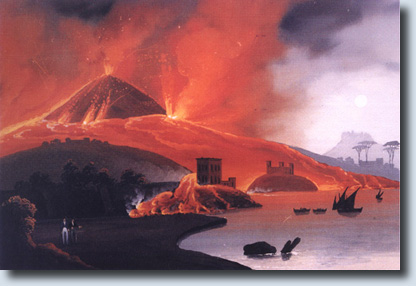
150th Anniversary of the Vesuvius Volcano Observatory
"The residents of Pompeii, Herculaneum and Stabiae woke up this morning in 0079 and went about their normal chores. There was no reason for them to fear the mountain whose slopes they farmed. They lived in the shadow of Mt. Vesuvius, overlooking the Bay of Naples, Italy. But, about noon, without any warning, Mt. Vesuvius exploded. Vesuvius, the volcano, erupted, spewing stones and lava, burying Pompeii under 13 feet of ash, and covering Herculaneum and Stabiae with mud and debris.
Most of the Romans were buried alive, the layers of volcanic ash preserving them and the remains of Pompeii. The story of this fateful day began to unfold for later generations when archaeologists first uncovered an outer wall of Pompeii in 1748. 2,000 skeletons were eventually uncovered in the Pompeiian ruins, but no one really knows how many thousands more people died from the choking, poisonous fumes and suffocating ash.
There were eye-witness accounts of the tragedy. Pliny the Elder, a natural historian, was commander of the Roman fleet at the time of the eruption. He sailed across the Bay of Naples to get a closer look at the volcanic activity and to rescue survivors. Unable to make any rescues, he was probably overcome by the gaseous fumes and died. Those who had accompanied him gave first-hand reports to Pliny the Elder’s nephew, Pliny the Younger, who wrote two letters outlining, in vivid detail, the events of this day.
Mt. Vesuvius, the peaceful, beautiful mountain, that made its first appearance as a volcano on this day in 79 A.D., is still considered an active volcano." (From 440 International, Those Were The Days)
Round Midnite: 0 through 9
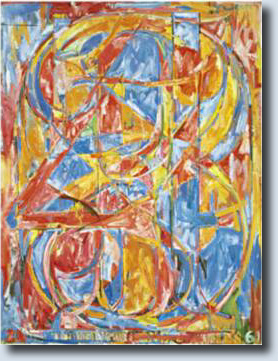
Jasper Johns: 0 through 9
A slow news day, at least historically, so I had this painting in mind for just such a rainy day, and thought I'd take this opportunity to share it. Jasper Johns, an American icon. (Of course, he did the American Flags, too, but this one is less well-known.) And, while we're at it, here's another artist with whom Johns is often linked, Marcel Duchamp, and the Nude Descending A Staircase, perhaps my own personal favorite painting of this period.
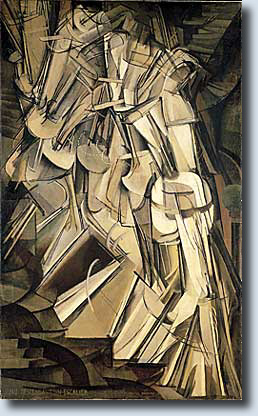
Marcel Duchamp: Nude Descending a Staircase (No. 2), 1912
"This painting created a sensation when it was exhibited in New York in February 1913 at the historic Armory Show of contemporary art, where perplexed Americans saw it as representing all the tricks they felt European artists were playing at their expense. The picture's outrageousness surely lay in its seemingly mechanical portrayal of a subject at once so sensual and time-honored. The Nude's destiny as a symbol also stemmed from its remarkable aggregation of avant-garde concerns: the birth of cinema; the Cubists' fracturing of form; the Futurists' depiction of movement; the chromophotography of Etienne-Jules Marey, Eadweard Muybridge, and Thomas Eakins; and the redefinitions of time and space by scientists and philosophers. The painting was bought directly from the Armory Show for three hundred dollars by a San Francisco dealer. Marcel Duchamp's great collector-friend Walter Arensberg was able to buy the work in 1927, eleven years after Duchamp had obligingly made him a hand-colored, actual-size photographic copy. Today both the copy and the original, together with a preparatory study, are owned by the Museum." (From the Philadelphia Museum of Art)
4:39pm: Wit of the Round Table

Dorothy Parker
This date marks several noteworthy landmarks, including the inaugural sailing of the America's Cup race around the Isle of Wight, won by the U.S. built schooner America in 1851, and the last major battle of the War of the Roses, the Battle of Bosworth Field, in 1485, wherein King Richard III was defeated and killed by Henry Tudor, ending the bloody War of the Roses.
However, it is the birthdate of Dorothy Parker, resident wit and champion of the Algonquin Round Table, whose New Yorker Column, The Constant Reader was the springboard for some of the most noteworthy, satirical, and literary browbeating in the history of letters, that we shall here celebrate. Here is a small sampling of Parker's wit and humor:
"It's a small apartment, I've barely enough room to lay my hat and a few friends."
On learning that Calvin Coolidge was dead she remarked, "How could they tell?"
"Are you Dorothy Parker?" a guest at a party inquired. "Yes, do you mind?"
On being asked to use "horticulture" in a sentence: "You can lead a horticulture but you can't make her think."
In a book review, in The Constant Reader: "This is not a novel to be tossed aside lightly. It should be thrown aside with great force."
In 1925, Harold Ross was struggling to keep The New Yorker magazine alive with a tiny, inexperienced staff and an office with one typewriter. Running into Dorothy, Ross said, "I thought you were coming into the office to write a piece last week. What happened?" Dorothy replied, "Somebody was using the pencil."
"I can't write five words but that I change seven."
"Brevity is the soul of lingerie."
"I like to have a martini, Two at the very most. After three I'm under the table, After four I'm under my host!"
In the street once Dorothy approached a taxi. "I'm engaged," the cabbie said. "Then be happy," she told him.
Wasn't the Yale prom wonderful? "If all the girls in attendance were laid end to end," she said, "I wouldn't be at all surprised."
"Look at him, a rhinestone in the rough."
"Salary is no object: I want only enough to keep body and soul apart."
"You know, that woman speaks 18 languages, and she can't say "no" in any of them."
"His body has gone to his head."
In a 1933 review of the play "The Lake" starring Katherine Hepburn: "Miss Hepburn runs the gamut of emotions from A to B."
"Men seldom make passes at girls who wear glasses."
Of the play "The House Beautiful": "The House Beautiful is The Play Lousy."
Young man to Dorothy Parker: "I can't bear fools." Dorothy Parker to young man: "Funny, your mother could."
In a New Yorker review of A.A. Milne's "House at Pooh Corner": "Tonstant weader fwowed up."
Another book review: "He is beyond question a writer of power; and his power lies in his ability to make sex so thoroughly, graphically and aggressively unattractive that one is fairly shaken to ponder how little one has been missing."
For her own epitaph:"Excuse my dust."
Her Poetry:
Résumé
Razors pain you;
Rivers are damp;
Acids stain you;
And drugs cause cramp.
Guns aren't lawful;
Nooses give;
Gas smells awful;
You might as well live.
-and-
If I don't drive around the park,
I'm pretty sure to make my mark.
If I'm in bed each night by ten,
I may get back my looks again.
If I abstain from fun and such,
I'll probably amount to much;
But I shall stay the way I am,
Because I do not give a damn.
Dorothy Parker: one of a kind, a diamond, period.
9:56pm: A Star Is Born
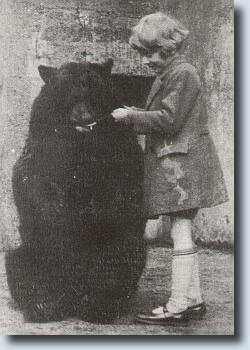
Christopher Robin with Winnie
August 21, 1920 Christopher Robin's birthday
"On this day, Daphne Milne, wife of writer A.A. Milne, gives birth to a son, who the couple name Christopher Robin Milne. Christopher Robin will be immortalized in A.A. Milne's books Winnie-the-Pooh (click for full online text) and The House at Pooh Corner.
A.A. Milne was born in London in 1882, the youngest of three sons. His parents were both schoolteachers; his father was headmaster at a school where H.G. Wells taught. His family claimed Milne taught himself to read at age two. He began writing humorous pieces as a schoolboy and continued at Cambridge, where he edited the undergraduate paper. In 1903, he left Cambridge and went to London to write. Although he was broke by the end of his first year, he persevered and supported himself until 1906 with his writing. That year, he joined humor magazine Punch as an editor and wrote humorous verse and essays for the magazine for eight years, until World War I broke out. While at Punch, he wrote his first book-for adults, not children.
In 1913, he married Daphne and two years later went to France to serve in World War I. While in the military, he wrote three plays, one of which, Mr. Pim Passes By, became a hit in 1919 and provided financial security for the family. In 1920, the couple's only son, Christopher Robin, was born. In 1925, the family bought Cotchford Farm in Sussex; a nearby forest inspired the 100-Acre Wood where Winnie-the-Pooh's adventures would be set.
Milne published two volumes of the verse he wrote for his son. When We Were Very Young was published in 1924, followed by Now We Are Six in 1927.
When Christopher Robin was about one, he received a stuffed bear as a present. The child soon accumulated a collection of similar animals, which inspired Milne to begin writing a series of whimsical stories about the toys. Winnie-the-Pooh was published in 1926 and The House at Pooh Corner in 1928. Ernest Shepard illustrated the books, using Christopher Robin and his animals as models.
A.A. Milne wrote numerous other books and plays, but is remembered almost solely for his beloved children's work. He died in 1956." (From The History Channel.com)
12:38AM: SOVIETS INVADE CZECHOSLOVAKIA
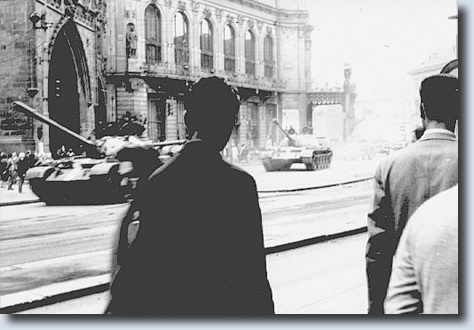
Soviet Tanks Invade Czechoslovakia, 1968
"On the night of August 20, 1968, approximately 200,000 Warsaw Pact troops and 5,000 tanks invade Czechoslovakia to crush the "Prague Spring"- -a brief period of liberalization in the communist country. Czechoslovakians protested the invasion with public demonstrations and other non-violent tactics, but they were no match for the Soviet tanks. The liberal reforms of First Secretary Alexander Dubcek were repealed and "normalization" began under his successor Gustav Husak.
Pro-Soviet communists seized control of Czechoslovakia's democratic government in 1948. Soviet leader Joseph Stalin imposed his will on Czechoslovakia's communist leaders, and the country was run as a Stalinist state until 1964, when a gradual trend toward liberalization began. However, modest economic reform was not enough for many Czechoslovakians, and beginning in 1966 students and intellectuals began to agitate for changes to education and an end to censorship. First Secretary Antonín Novotný's problems were made worse by opposition from Slovakian leaders, among them Alexander Dubcek and Gustav Husak, who accused the central government of being dominated by Czechs.
In January 1968, Novotný was replaced as first secretary by Alexander Dubcek, who was unanimously elected by the Czechoslovakian Central Committee. To secure his power base, Dubcek appealed to the public to voice support for his proposed reforms. The response was overwhelming, and Czech and Slovak reformers took over the communist leadership.
In April, the new leadership unveiled its "Action Program," promising democratic elections, greater autonomy for Slovakia, freedom of speech and religion, the abolition of censorship, an end to restrictions on travel, and major industrial and agricultural reforms. Dubcek declared that he was offering "socialism with a human face." The Czechoslovakian public greeted the reforms joyously, and Czechoslovakia's long stagnant national culture began to bloom during what became known as the Prague Spring. In late June, a much- signed petition called the "Two Thousand Words" was published calling for even more rapid progress to full democracy. The Soviet Union and its satellites Poland and East Germany were alarmed by what appeared to be the imminent collapse of communism in Czechoslovakia.
Soviet leader Leonid Brezhnev warned Dubcek to halt his reforms, but the Czechoslovakian leader was buoyed by his popularity and dismissed the veiled threats. Dubcek declined to attend a special meeting of the Warsaw Pact powers in July, but on August 2 he agreed to meet with Brezhnev in the Slovakian town of Cierná. The next day, representatives of European Europe's communist parties met in the Slovakian capital of Bratislava, and a communiqué was issued suggesting that pressure would be eased on Czechoslovakia in exchange for tighter control over the press.
However, on the night of August 20, nearly 200,000 Soviet, East German, Polish, Hungarian, and Bulgarian troops invaded Czechoslovakia in the largest deployment of military force in Europe since the end of World War II. Armed resistance to the invasion was negligible, but protesters immediately took to the streets, tearing down streets signs in an effort to confuse the invaders. In Prague, Warsaw Pact troops moved to seize control of television and radio stations. At Radio Prague, journalists refused to give up the station and some 20 people were killed before it was captured. Other stations went underground and succeeded in broadcasting for several days before their locations were discovered.
Dubcek and other government leaders were detained and taken to Moscow. Meanwhile, widespread demonstrations continued on the street, and more than 100 protesters were shot to death by Warsaw Pact troops. Many foreign nations, including China, Yugoslavia, and Rumania, condemned the invasion, but no major international action was taken. Much of Czechoslovakia's intellectual and business elite fled en masse to the West.
On August 27, Dubcek returned to Prague and announced in an emotional address that he had agreed to curtail his reforms. Hard-line communists assumed positions in his government, and Dubcek was forced gradually to dismiss his progressive aides. He became increasingly isolated from both the public and his government. After anti-Soviet rioting broke out in April 1969, he was removed as first secretary and replaced by Gustav Husak, a "realist" who was willing to work with the Soviets. Dubcek was later expelled from the Communist Party and made a forest inspector based in Bratislava.
In 1989, as communist governments collapsed across Eastern Europe, Prague again became the scene of demonstrations for democratic reform. In December 1989, Gustav Husak's government conceded to demands for a multiparty parliament. Husak resigned, and for the first time in nearly two decades Dubcek returned to politics as chairman of the new parliament, which subsequently elected playwright and former dissident Václav Havel as president of Czechoslovakia. Havel had come to fame during the Prague Spring, and after the Soviet crackdown his plays were banned and his passport confiscated." (From The History Channel)
Too Late: Nabokov's Masterpiece is Published

Original 1958 Edition
August 18, 1958: Lolita by Vladimir Nabokov is published
"On this day in 1958, Vladimir Nabokov's controversial novel Lolita is published in the U.S.
The novel, about a man's obsession with a 12-year-old girl, had been rejected by four publishers before G.P. Putnam's Sons accepted it. The novel became a bestseller that allowed Nabokov to retire from his career as college professor.
Nabokov was born in 1899 in St. Petersburg, Russia, into a wealthy and privileged family. He lived in a St. Petersburg townhouse and on a country estate, and learned boxing, tennis, and chess. He grew up speaking both English and Russian, attended Cambridge, and inherited $2 million from an uncle. However, his family lost much of their wealth when the Russian Revolution forced them to flee to Germany. Nabokov earned money by teaching boxing and tennis, and creating Russian crossword puzzles. He worked during the day and wrote at night, sometimes in the bathroom so the light wouldn't bother his family. He wrote many novels and short stories in Russian. In 1939, the tall, athletic scholar was invited to Stanford to lecture on Slavic languages. He stayed in the U.S. for 20 years, teaching at Wellesley and Cornell, and pursuing an avid interest in butterflies. (In fact, he was a research fellow at Harvard's Museum of Comparative Zoology and discovered several species and subspecies of butterflies.) He and his wife, Vera, spent summers driving around the U.S., staying in motels, and looking for butterflies. The motels, the American landscape, and butterflies all figure prominently in various works.
Nabokov's first novel in English was The Real Life of Sebastian Knight. His most successful books in the U.S. were Lolita and Ada (1969), a family chronicle about a childhood romance between two close relations, which becomes a lifelong obsession between the characters.
Nabokov and his wife returned to Europe in 1959, and he died in Switzerland in 1977." (From The History Channel)
12:24am: A Nation Mourns The King of Rock and Roll

Elvis at his goodbye party on the set of King
Creole early march 1958, just before draft
25 Years Ago Today:
August 16, 1977
"Popular music icon Elvis Presley dies in Memphis, Tennessee. He was 42. The death of the "King of Rock and Roll" brought legions of mourning fans to Graceland, his mansion in Memphis. Doctors said he died of a heart attack, largely brought on by his addiction to prescription barbiturates, but some labeled it suicide.
Elvis Presley was born in Tupelo, Mississippi, on January 8, 1935. His twin brother, Jesse, died during the birth. Elvis grew up dirt-poor in Tupelo and Memphis and found work as a truck driver after high school. When he was 19, he walked into a Memphis recording studio and paid $4 to record a few songs as a present to his mother. Sam Philips, the owner of the studio, was intrigued by the rough, soulful quality of his voice and invited Presley back to practice with some local musicians. After Philips heard Elvis sing the rhythm-and-blues song "That's All Right," which Presley imbued with an accessible country-and-western flavor, he agreed to release the rendition as a single on his Sun Records label. The recording went to the top of the local charts, and Presley's career was launched.
During the next year, Elvis attracted a growing following in the South, and in 1955 Sun Records sold his contract to a major record label, the Radio Corporation of America (RCA), for a record $40,000. His first record for RCA was "Heartbreak Hotel," which made him a national sensation in early 1956. He followed this up with the double-sided hit record "Hound Dog"/"Don't Be Cruel." In September 1956, Elvis appeared on The Ed Sullivan Show, a national variety television show, and teenagers went into hysterics over his dynamic stage presence, good looks, and simple but catchy songs. Many parents, however, were appalled by his sexually suggestive pelvic gyrations, and by his third appearance on The Ed Sullivan Show, Elvis was filmed from only the waist up.
From 1956 through 1958, Elvis dominated the music charts and ushered in the age of rock and roll, opening doors for both white and black rock artists. During this period, he starred in four successful motion pictures, all of which featured his soundtracks: Love Me Tender (1956), Jailhouse Rock (1957), Loving You (1957), and King Creole (1958).
In 1958, Presley was drafted into the U.S. Army and served an 18- month tour of duty in West Germany as a Jeep driver. Teenage girls were overcome with grief, but Elvis' manager, Colonel Tom Parker, kept American youth satiated with stockpiled recordings that Presley made before his departure. All five singles released during this period eventually became million-sellers.
After being discharged as a sergeant in 1960, Elvis underwent a style change, eschewing edgy, rhythm-and-blues-inspired material in favor of romantic, dramatic ballads such as "Are You Lonesome Tonight?" He retired from concerts to concentrate on his musical films, and he made 27 in the 1960s, including G.I. Blues (1960), Blue Hawaii (1961), Girls! Girls! Girls! (1962), Viva Las Vegas (1964), and Frankie and Johnny (1966). In 1967, he married Priscilla Beaulieu, and the couple had a daughter, Lisa Marie, in 1968.
By the end of the 1960s, rock and roll had undergone dramatic changes, and Elvis was no longer seen as relevant by American youth. A 1968 television special won back many of his fans, but hits were harder to come by. His final Top 10 entry, "Burning Love," was in 1972. Still, he maintained his sizable fortune through lucrative concert and television appearances.
By the mid 1970s, Elvis was in declining physical and mental health. He divorced his wife in 1973 and developed a dangerous dependence on prescription drugs. He was also addicted to junk food and gained considerable weight. In the last two years of his life, he made erratic stage appearances and lived nearly as a recluse. On the afternoon of August 16, 1977, he was found unconscious in his Graceland mansion and rushed to the hospital, where he was pronounced dead. He was buried on the grounds of Graceland, which continues to attract fans and has been turned into a highly successful tourist attraction." (From The History Channel)
12:39am: The Berlin Wall Goes Up
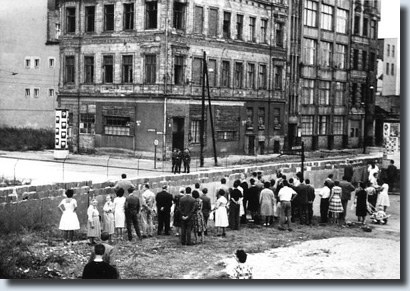
Berlin, 1961. Berlin Wall at Zimmerstrasse
West Berliners watching over the Wall to the East
August 15, 1961:
"Two days after sealing off free passage between East and West Berlin with barbed wire, East German authorities begin building a wall--the Berlin Wall--to permanently close off access to the West. For the next 28 years, the heavily fortified Berlin Wall stood as the most tangible symbol of the Cold War--a literal "iron curtain" dividing Europe.
The end of World War II in 1945 saw Germany divided into four Allied occupation zones. Berlin, the German capital, was likewise divided into occupation sectors, even though it was located deep within the Soviet zone. The future of Germany and Berlin was a major sticking point in postwar treaty talks, and tensions grew when the United States, Britain, and France moved in 1948 to unite their occupation zones into a single autonomous entity--the Federal Republic of Germany (West Germany). In response, the USSR launched a land blockade of West Berlin in an effort to force the West to abandon the city. However, a massive airlift by Britain and the United States kept West Berlin supplied with food and fuel, and in May 1949 the Soviets ended the defeated blockade.
By 1961, Cold War tensions over Berlin were running high again. For East Germans dissatisfied with life under the communist system, West Berlin was a gateway to the democratic West. Between 1949 and 1961, some 2.5 million East Germans fled from East to West Germany, most via West Berlin. By August 1961, an average of 2,000 East Germans were crossing into the West every day. Many of the refugees were skilled laborers, professionals, and intellectuals, and their loss was having a devastating effect on the East German economy. To halt the exodus to the West, Soviet leader Nikita Khruschev recommended to East Germany that it close off access between East and West Berlin.
On the night of August 12-13, 1961, East German soldiers laid down more than 30 miles of barbed wire barrier through the heart of Berlin. East Berlin citizens were forbidden to pass into West Berlin, and the number of checkpoints in which Westerners could cross the border was drastically reduced. The West, taken by surprise, threatened a trade embargo against East Germany as a retaliatory measure. The Soviets responded that such an embargo be answered with a new land blockade of West Berlin. When it became evident that the West was not going to take any major action to protest the closing, East German authorities became emboldened, closing off more and more checkpoints between East and West Berlin. On August 15, they began replacing barbed wire with concrete. The wall, East German authorities declared, would protect their citizens from the pernicious influence of decadent capitalist culture.
The first concrete pilings went up on the Bernauer Strasse and at the Potsdamer Platz. Sullen East German workers, a few in tears, constructed the first segments of the Berlin Wall as East German troops stood guarding them with machine guns. With the border closing permanently, escape attempts by East Germans intensified on August 15. Conrad Schumann, a 19-year-old East German soldier, provided the subject for a famous image when he was photographed leaping over the barbed-wire barrier to freedom.
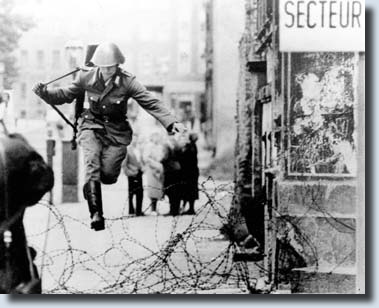
19-year-old Hans Conrad Schumann
the first border guard to defect
August 15, 1961
During the rest of 1961, the grim and unsightly Berlin Wall continued to grow in size and scope, eventually consisting of a series of concrete walls up to 15 feet high. These walls were topped with barbed wire and guarded with watchtowers, machine gun emplacements, and mines. By the 1980s, this system of walls and electrified fences extended 28 miles through Berlin and 75 miles around West Berlin, separating it from the rest of East Germany. The East Germans also erected an extensive barrier along most of the 850-mile border between East and West Germany.
In the West, the Berlin Wall was regarded as a major symbol of communist oppression. About 5,000 East Germans managed to escape across the Berlin Wall to the West, but the frequency of successful escapes dwindled as the wall was increasingly fortified. Thousands of East Germans were captured during attempted crossings and 191 were killed.
In 1989, East Germany's communist regime was overwhelmed by the democratization sweeping across Eastern Europe. On the evening of November 9, 1989, East Germany announced an easing of travel restrictions to the West, and thousands demanded passage though the Berlin Wall. Faced with growing demonstrations, East German border guards opened the borders. Jubilant Berliners climbed on top of the Berlin Wall, painted graffiti on it, and removed fragments as souvenirs. The next day, East German troops began dismantling the wall. In 1990, East and West Germany were formally reunited." (From The History Channel)
1:21pm: Woodstock!
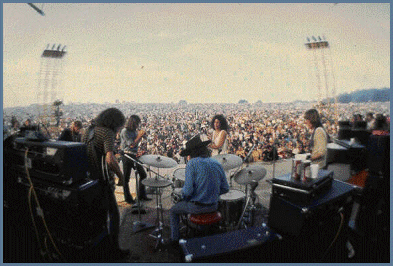
Grace Slick & Jefferson Airplane at Woodstock
"They came by the thousands. They came from every corner of the U.S. and many came from other countries. It was a pilgrimage to a farm owned by Max Yasgur in an area of Sullivan County, New York called Bethel. In a manner of speaking, this was a religious experience. It was a pilgrimage for love, and peace. And throughout it all, the music played.
The Woodstock Music and Art Fair opened on this day in 1969. Two dozen bands came to play on a wooden stage in the middle of a pasture. It was a happening unlike any other before it ... and, probably like none after. 450,000 people formed a love-in for three days and nights. Jimi Hendrix was there, Joan Baez, and Arlo Guthrie, too. Country Joe and the Fish, Santana, Crosby, Stills and Nash. Jefferson Airplane, Creedence Clearwater Revival, The Who, and so many more. There were hippies, and bikers, Viet Nam war vets, and high school kids ... college kids and college grads, longhaired and short, young and old ... and the world watched and joined in through the magic of the media.
They came by the thousands. The music played, people danced and sang. And the memories went home with them. Woodstock marked an era.
Groovy! Far out! Like, wow, man! Power to the people! And, of course... Peace, brother!" (from Those Were The Days)
12:00am: The Master of Suspense
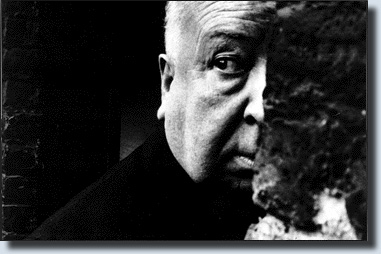
"Alfred Hitchcock, the macabre master of moviemaking, is born in London on August 13, 1899. His innovative directing techniques and mastery of suspense made him one of the most popular and influential filmmakers of the 20th century.
Born the son of a grocer, Hitchcock attended St. Ignatius College, a Jesuit school in London where he studied engineering, and took art courses at the University of London. In 1920, he began to work in the silent-film industry, writing and illustrating title cards. Determined to become a filmmaker himself, he rose to the positions of art director, scriptwriter, and assistant director. In 1925, he directed his first film, The Pleasure Garden. With The Lodger (1926), the story of a man wrongly suspected of being Jack the Ripper, Hitchcock began making the suspense dramas with which he was to become identified.
His Blackmail (1929) was Britain's first widely successful talking feature, and Hitchcock used sound effectively and imaginatively. During the 1930s, he gained international fame with immensely popular thrillers such as The Man Who Knew Too Much (1934), The 39 Steps (1935), and The Lady Vanishes (1938). In 1939, he left England for Hollywood, lured by its superior technical facilities. His first American film was Rebecca (1940), a drama starring Laurence Olivier that won an Academy Award for Best Picture and further cemented Hitchcock's reputation.
Hitchcock remained in Hollywood and directed a string of memorable thrillers in the 1940s, including Suspicion (1941), Shadow of a Doubt (1943), and Notorious (1946). By the 1940s, he was serving as his own producer, thereby ensuring greater artistic control over his films. The psychologically complex and technically innovative films that followed are regarded as his most brilliant. These masterpieces of moviemaking, which starred some of the leading actors and actresses of Hollywood, include Strangers on a Train (1951), Dial M for Murder (1954), Rear Window (1954), To Catch a Thief (1954), Vertigo (1958), North by Northwest (1959), Psycho (1960), and The Birds (1963). In these meticulously orchestrated films, protagonists descend out of everyday life into tense and nightmarish situations where nothing is as it seems. To build and maintain suspense, Hitchcock employed unusual camera angles, elaborate editing techniques, dynamic soundtrack music, and touches of wry humor and the macabre.
With his courtly manner, pear-shaped figure, and farcical drawl, Hitchcock became a celebrity in his own right, and in the 1950s and 1960s he produced and hosted two mystery series on television, "Alfred Hitchcock Presents" and "The Alfred Hitchcock Hour." He also made cameos in most of his films, and movie fans stayed alert to catch his fleeting, often humorous appearances on the screen.
Although he never won an Oscar for his film direction, he received the prestigious Irving Thalberg Award from the Academy of Motion Picture Arts and Sciences in 1967. In 1980, he was knighted by Queen Elizabeth II of his native Britain, even though he had long been a naturalized U.S. citizen. Hitchcock died later that year, having directed nearly 60 films in his long career." (From The History Channel)
My favorite Hitchcock flick: Foreign Correspondent (1940) with Joel McCrae, Laraine Day, Robert Benchley, George Sanders, (and a half-vote to Sabateur, 1942, with Robert Cummings and that famous Statue of Liberty finale);
2nd Favorite: Dial "M" For Murder, 1954, Grace Kelly, Ray Milland, Robert Cummings;
3rd Favorite: Tie between the James Stewart Trio: Rear Window (1954 w. Grace Kelly), The Man Who Knew Too Much (1956 remake, w. Doris Day), and Vertigo (1958, w. the haunting Kim Novak) and the Cary Grant trio: Notorious (1946, w. Ingrid Bergman), To Catch A Thief (1955, w. Grace Kelly), and North by Northwest (1959, w. Eva Marie Saint).
11:37am: Care to trade with this guy?
This is the entire contents of an email I got from a football teammate, and when I asked him for the source and result, he didn't have any answers, said it had been forwarded from a friend to whom it was forwarded from a friend:
AND YOU THINK YOUR HAVING A BAD DAY AT WORK !!
Although this looks like a picture taken from a Hollywood movie, it is in fact a real photo, taken near the South African coast during a military exercise by the British Navy.
It has been nominated by Geo as "THE photo of the year".
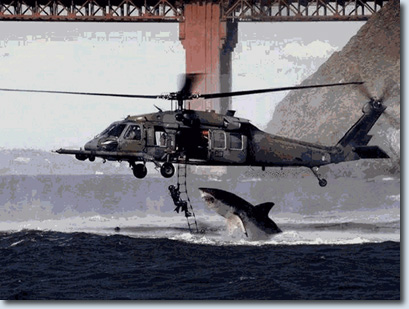
Well, that what the email said. You can draw your own conclusions, I'm just passing it along, but if that's a real photo, I'm not sure I want to know how it turned out...
Oh, and have a nice day...
THIS JUST IN--IT IS A HOAX! CLICK HERE FOR NATIONAL GEOGRAPHIC.COM'S PUBLISHED WEBPAGE REVEALING THE HOAX!
11:02am: The Greatest French Short Story Writer
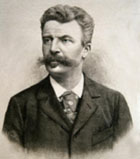
Guy de Maupassant
August 5, 1850: Guy de Maupassant's birthday
(From The History Channel)"French writer Guy de Maupassant, one of France's best short-story writers, is born on this day near Dieppe, France.
Maupassant began studying law in 1869 but interrupted his studies to volunteer for the army during the Franco-Prussian War. In 1871, following the war, he went to Paris. Gustave Flaubert, a good friend of Maupassant's mother, agreed to keep an eye on the young man, who was running wild in Paris. When Maupassant showed an interest in writing, Flaubert became his mentor, introducing him to the most prominent writers of the time, including Emile Zola and Henry James.
In 1880, Zola edited a collection of six short stories about war. He selected an exceptional story by Maupassant called "Boule de Suif" ("Ball of Fat"), which distinguished the young writer immediately. Maupassant produced some 300 short stories, six novels, and several nonfiction books in 10 years. He drew on his own experiences in the army, and later the civil service, to write vivid, detailed stories about the military and bureaucracy, as well as class injustices, in a distinctly Naturalist style that influenced Zola's own writing. Maupassant's major works include A Life (1883), The Rondoli Sisters (1884), and Le Horla (1887).
Maupassant contracted syphilis in his 20s, and the disease resulted in hallucinations, suicidal impulses, and insanity in his 40s. He died in an insane asylum in 1893."
Incidentally, there is an interesting connection between this date, Maupassant, and Hollywood, as this is also the birthday of the great actor/director John Huston (The Maltese Falcon, The Asphalt Jungle, The African Queen, The Misfits, etc.) and the day that Marilyn Monroe died in 1962. Huston directed Monroe in the Asphalt Jungle and The Misfits, and later narrated a biography of her life. And Maupassant's great story "Boule de Suif" was the inspiration for John Ford's great 1939 classic western "Stagecoach," which would have won the Best Picture Oscar if it were not released the same year as "The Wizard of Oz," which would have won the Best Picture Oscar if it were not released the same year as "Gone With The Wind," which would have won...oh, that one won, and that's the score. (1-1)
High Noon: Video Killed The Radio Star

(From 440 International, Those Were The Days)"MTV (Music Television) made its debut at 12:01 a.m. on this day in 1981. The first music video shown on the rock-video cable channel was, appropriately, Video Killed the Radio Star, by the Buggles. MTV’s original five veejays were Martha Quinn, Nina Blackwood, Mark Goodman, J.J. Jackson and Alan Hunter.
Since MTV is targeted to 18- to 24-year-olds, its music videos feature rock, rap, R&B and heavy metal. Today, the radio-with-pictures TV channel does more than play wall-to-wall music. Watch MTV and you’ll see news, drama, game shows, comedy, dance shows and inaugural balls.
In 1987, having reached the near-saturation point on U.S. cable systems, MTV expanded internationally with MTV Europe. Two years later, and just two days before the Berlin Wall came down, MTV went on the air in East Berlin. A big push into Asia was launched in September of 1991, and in the fall of 1993, MTV went Latin with MTV Latino.
Wow! Zillions of households worldwide all want... and can get... their MTV!"